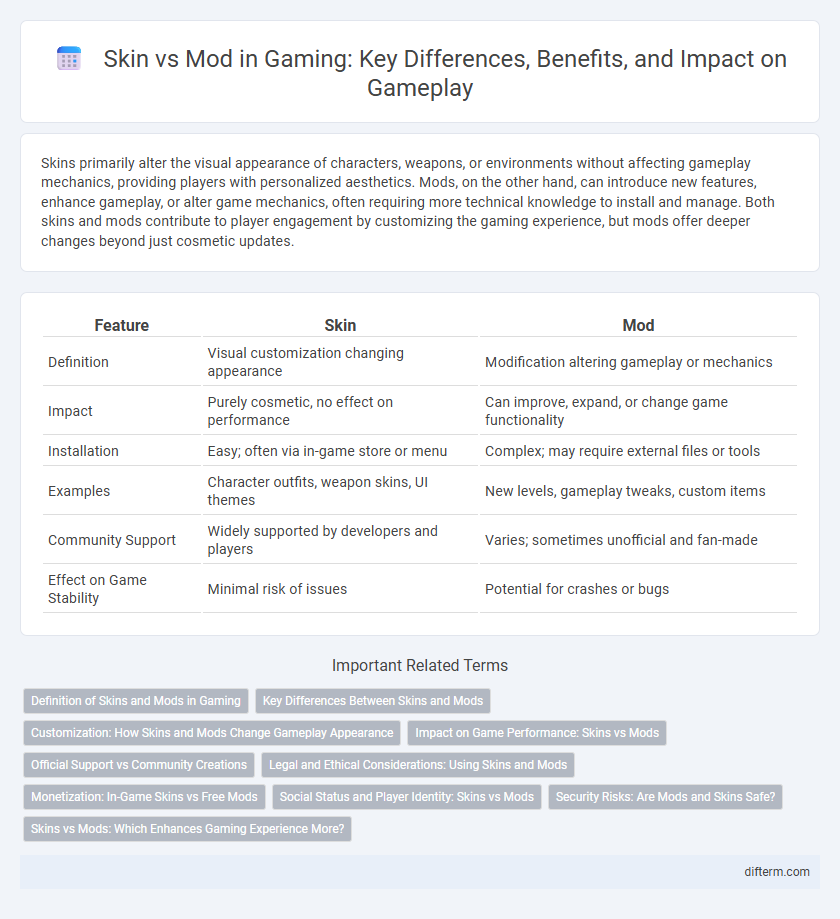Skins primarily alter the visual appearance of characters, weapons, or environments without affecting gameplay mechanics, providing players with personalized aesthetics. Mods, on the other hand, can introduce new features, enhance gameplay, or alter game mechanics, often requiring more technical knowledge to install and manage. Both skins and mods contribute to player engagement by customizing the gaming experience, but mods offer deeper changes beyond just cosmetic updates.
Table of Comparison
| Feature | Skin | Mod |
|---|---|---|
| Definition | Visual customization changing appearance | Modification altering gameplay or mechanics |
| Impact | Purely cosmetic, no effect on performance | Can improve, expand, or change game functionality |
| Installation | Easy; often via in-game store or menu | Complex; may require external files or tools |
| Examples | Character outfits, weapon skins, UI themes | New levels, gameplay tweaks, custom items |
| Community Support | Widely supported by developers and players | Varies; sometimes unofficial and fan-made |
| Effect on Game Stability | Minimal risk of issues | Potential for crashes or bugs |
Definition of Skins and Mods in Gaming
Skins in gaming refer to cosmetic changes that alter the appearance of characters, weapons, or items without affecting gameplay mechanics, offering players a personalized visual experience. Mods, or modifications, are user-created content that can significantly change or enhance game features, including new levels, gameplay mechanics, or character abilities, often extending the game's lifespan. Both skins and mods serve to customize the gaming experience, with skins focusing on aesthetics and mods on functional alterations.
Key Differences Between Skins and Mods
Skins in gaming primarily alter the visual appearance of characters, weapons, or environments without affecting gameplay mechanics or functionality. Mods introduce significant changes to gameplay, adding new features, mechanics, or altering game behavior beyond aesthetics. While skins cater to personalization and style, mods focus on enhancing or transforming the overall gaming experience.
Customization: How Skins and Mods Change Gameplay Appearance
Skins exclusively alter the visual appearance of characters, weapons, and interfaces without affecting gameplay mechanics, offering players personalized aesthetics and unique styles. Mods, however, can fundamentally change gameplay elements such as abilities, mechanics, and level design, enabling deeper customization and new experiences beyond mere visuals. Both skins and mods enhance player engagement by providing varied customization options, but mods deliver more profound gameplay transformations compared to the purely cosmetic impact of skins.
Impact on Game Performance: Skins vs Mods
Skins primarily alter the visual appearance of characters or items without affecting core game mechanics, resulting in negligible impact on game performance or system resources. Mods can introduce new gameplay features, mechanics, or assets, which may increase processing load, cause compatibility issues, or affect frame rates depending on their complexity. Game stability and performance optimization often depend on how extensively mods modify the game's codebase compared to the lightweight cosmetic nature of skins.
Official Support vs Community Creations
Official skins in gaming are developed and endorsed by the game developers, ensuring full compatibility, stability, and compliance with the game's design and narrative. Mods, often created by the community, offer extensive customization and creativity but may lack official support, potentially leading to compatibility issues or game instability. The distinction between official skins and community mods highlights the balance between guaranteed quality and innovative freedom within gaming customization.
Legal and Ethical Considerations: Using Skins and Mods
Using skins in gaming typically complies with game developers' terms of service, as they are official cosmetic items designed to enhance player experience without altering gameplay mechanics. Mods, however, can raise legal and ethical issues when they modify game code or provide unfair advantages, potentially breaching copyright laws and community guidelines. Players should carefully review the licensing agreements and community standards to avoid unauthorized modifications that could result in account suspension or legal consequences.
Monetization: In-Game Skins vs Free Mods
In-game skins generate significant revenue through microtransactions, offering players cosmetic customization without altering gameplay mechanics, thus maintaining fair competition. Free mods, often created by the community, enhance or change gameplay but typically lack direct monetization, relying on user goodwill and donations. The monetization model of skins capitalizes on exclusive designs and limited-time offers, driving continuous spending compared to the donation-dependent and non-commercial nature of mods.
Social Status and Player Identity: Skins vs Mods
Skins serve as visual representations of player identity, enhancing social status within gaming communities by showcasing rare or exclusive designs. Mods, while often improving gameplay or adding new features, contribute more to individual player creativity and technical skill than social recognition. The distinction highlights how skins primarily influence player appearance and status symbols, whereas mods emphasize customization and gameplay innovation.
Security Risks: Are Mods and Skins Safe?
Mods often pose higher security risks than skins, as they can modify game code and potentially introduce malware or unauthorized access to personal data. Skins generally present fewer threats since they mostly change cosmetic appearances without altering gameplay mechanics. Players should download mods and skins only from trusted sources and verify community reviews to minimize exposure to security vulnerabilities.
Skins vs Mods: Which Enhances Gaming Experience More?
Skins primarily enhance the visual appeal of characters or items without altering gameplay mechanics, offering personalized aesthetics that boost player identity and immersion. Mods introduce new features, mechanics, or content that can profoundly change gameplay dynamics, often extending game longevity and creativity. Choosing between skins and mods depends on whether players value aesthetic customization or transformative gameplay experiences for enhanced engagement.
skin vs mod Infographic

 difterm.com
difterm.com